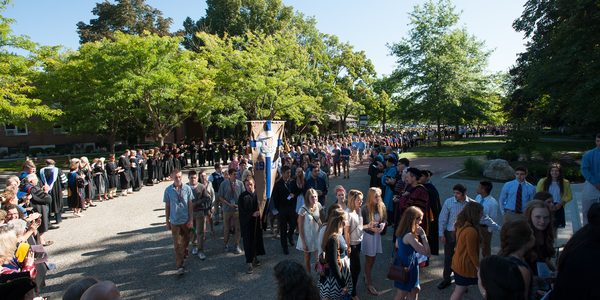What does it mean for Gonzaga University to call itself Catholic, Jesuit, and humanistic? Let’s be honest, these are strange words. The word “Catholic” might conjure up images of elaborate buildings or men in pointy hats. And, we rarely here the word ‘Jesuit’ in our daily lives, let alone “humanistic.” So what would it mean for an educational institution to be Catholic, Jesuit, and humanistic? Let’s take them in order.
Catholic, of course, refers to a religious tradition — thus the distinctive architecture and headgear. That religious tradition emerges from the experiences of a group of first-century Jews who were befriended by and fell in love with a man called Jesus. Jesus uniquely illuminated their human experience, willingly laid down his life for others, and rose from the dead, thereby revealing to them the fullness of his identity as the Christ, the anointed one of God. Having been fundamentally transformed by these events this group of Jews lived together in perfect community, preached Jesus’ gospel of forgiveness and love, and worshipped Jesus as God incarnate when they gathered to pray and share a ritual meal remembering his death and resurrection. To make a very long story too short, what we know as Catholicism is many ways simply a continuation of that somewhat peculiar way of living inaugurated by these first followers of Jesus. The Catholic Church, under the authority of the Bishop of Rome, often called simply “the Pope,” carries on that tradition of living in community, preaching the Gospel, and gathering for worship. For Gonzaga University to call itself Catholic is to affirm that it is part of this long, complex, sometimes confusing, and yet beautiful tradition that begins with Jesus.
So, then, what does it mean to be Jesuit? Put very simply, it is to be a friend of Jesus. Jesuits, or the Society of Jesus, are a religious order of Catholic priests and brothers who came on the scene in the 16th century. Under the inspiration of St. Ignatius Loyola, a former soldier, this group of itinerant preachers, who identified themselves as “los companeros de Jesus” (the companions, or company, of Jesus) began a program of education grounded in a method of entering into friendship with Jesus called the “Spiritual Exercises.” These exercises, developed by St. Ignatius, continue to help those who want to be closer to Jesus work through their fears and desires in order to more freely give themselves to others as Jesus did. Jesuit education forms “men and women for others,” persons who experience themselves as fully free when they follow their deepest desires and serve others. This means that students at Jesuit universities take courses that encourage them to explore what makes them feel fully alive. These courses ask students to reflect critically on themselves and their own thinking as they reflect critically on the experiences and ideas of others. Students at Jesuit universities should always be asking, “Why?” This leads many students to engage in service work, not in order to pad their resumes but to truly understand the experiences of others and to reflect critically on the conditions that lead to situations of prejudice, poverty, and injustice.
So, when Gonzaga talks about its “humanistic” identity it fundamentally refers to this deep care for the human person animated by the Catholic tradition and friendship with Jesus. Renaissance humanism, an intellectual movement that shaped the cultural environment of Europe at the time of the first Jesuits, profoundly influenced the mission of the Society. Humanists believed that each person could pursue a life a virtue provided a good education in the classics. The Jesuits took up this task of personal formation by developing what was called the ratio studiorum, a curriculum of classical learning meant to promote a life of civic virtue. The humanistic mission of Gonzaga is therefore to form responsible citizens who, having been formed by a deep exploration of the human search meaning, promote what is highest and best in the human community by serving others.
Now, this is all terribly general and brief. There is so much more to say on each of these terms. And, as a Catholic theologian, I bring a particular lens to my interpretation of their meaning. Nevertheless, what I hope to convey is that these terms are foundational to the mission of Gonzaga University and the kinds of graduates it hopes to produce: women and men who understand that to be fully alive is to live for others. That vision of a fully human life lived for others is promoted by an authentic humanism, nurtured by the Spiritual Exercises of St. Ignatius, and finds its perfection in a first-century Jew called Jesus who revealed God’s love for us by laying down his life so that others might live.
Dr. Joseph Mudd is an Associate Professor in the Department of Religious Studies.
